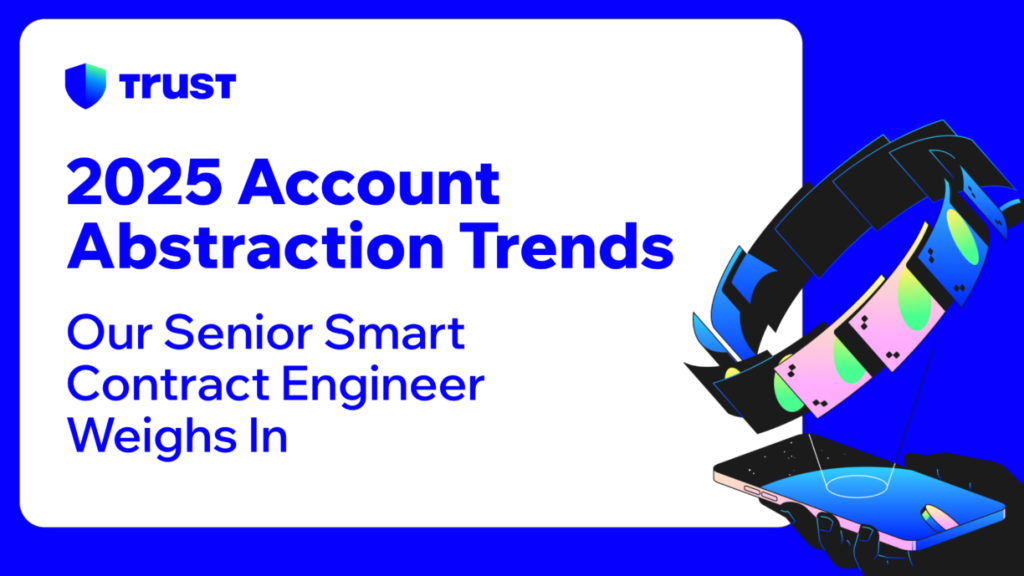2025 Account Abstraction Trends: Our Senior Smart Contract Engineer Weighs In


At Trust Wallet, we’re constantly innovating to ensure our users enjoy a secure, seamless, and cutting-edge experience. Recently, our Senior Smart Contract Engineer, David Kim, dived deep into the latest advancements and trends in wallets, smart wallet protocols, and chain abstraction technologies during Devcon, dubbed as “the Ethereum conference for developers, researchers, thinkers, and makers”.
From dissecting industry developments in ERC standards to anticipating trends that will shape 2025 —below, David shares his thoughts and findings from Devcon, while shedding light on the current landscape and a future outlook for Trust Wallet.
Thoughts and Findings from Devcon
Devcon was the perfect opportunity to connect with leaders across the wallet and blockchain space. Our primary focus was to explore developments in Account Abstraction (AA) and smart wallets, particularly around EIP 7702, as these are critical areas for Trust Wallet’s future. We also spent time engaging with general wallet users to gather feedback on their needs and pain points.

One of the most significant advancements discussed at Devcon was Account Abstraction (AA). This technology is revolutionizing how wallets operate by transforming traditional externally owned accounts (EOAs) into smart wallets. This transition enhances both functionality and security, making wallets more versatile and user-friendly.
Following the recent Pectra merge, the infrastructure supporting AA is rapidly evolving. Companies are preparing meticulously, with some even establishing dedicated EIP 7702 teams to lead this transition. The approaches to integrating EIP 7702 vary among wallet providers. Additionally, the Ethereum Foundation team, together with Etherspot, Fastlane, Candide launched the decentralized P2P mempool for ERC 4337— and it’s a pretty significant step for the AA ecosystem, considering that all existing UserOperations were generated through a private mempool.
But while enthusiasm for AA is high, many wallets are still in the early stages of mapping out how their existing products will transition to new standards. At Trust Wallet, we’re actively collaborating with industry leaders to navigate this shift smoothly, ensuring our users benefit from enhanced features without compromising security or usability.
Chain Abstraction: Bridging Multiple Blockchains Seamlessly
Chain abstraction is another pivotal trend shaping the future of Web3. By enabling interactions across different blockchains, chain abstraction solutions simplify user experiences and expand the potential of decentralized applications (DApps). Major wallet teams recognize its importance and believe its widespread adoption will accelerate once leading wallet companies implement these solutions.
For instance, Safe disclosed their network launch “SafeNet”. SafeNet is a transaction processing network that enables pre-confirmation of transactions on its network that separates the confirmation from the execution – while the actual settlement happens on the actual chain. They plan to integrate it into their flagship Multi-sig solution and their payment solution, Gnosis
Pay leveraging the fast block confirmation time of 500ms.
In our opinion, this was an interesting approach as the utility and use case were both very clear. However, we’ll monitor how this develops as it’s still in the infancy stages, and many unknowns
still exist.
All that said, at Trust Wallet, we’re dedicated to integrating chain abstraction technologies to provide our users with a fluid and unified experience, regardless of the underlying blockchain. This ensures that our wallet remains versatile and user-friendly, accommodating the diverse needs of our global user base.
In February 2024, we launched Trust Wallet SWIFT, a Smart Contract Wallet powered by Account Abstraction. SWIFT simplifies Web3 access with features like gas fee abstraction, one-click transactions, and biometric-protected Passkeys. And in May 2024, we open-sourced our smart wallet solution, Barzan ERC 4337 compatible Smart Contract Wallet focused on a secure and smarter experience for users through modular, upgradeable, and secure designs.
Leading the Way with ERC 7779: Trust Wallet’s Commitment to Standards
We also conducted an in-depth workshop focused on building EIP 7702 delegated accounts compatible with ERC 7779, attracting interest from diverse builders across the community. Additionally, collaborations with major wallet players are driving the adoption of ERC 7779, which ensures a unified and secure approach to smart wallet development.

Trust Wallet’s Smart Contract Wallet (SCW) team is proud to lead the industry with the ERC-7779: Interoperable Delegated Accounts standard, developed in collaboration with the Ethereum Foundation and other key partners. This standard is pivotal for creating interoperable and secure delegated accounts, enhancing the functionality and security of smart wallets.
Moving forward, we plan to release the ERC 7779 reference implementation and GitHub organization, further supporting developers in integrating these standards into their projects.
Looking Ahead to 2025: Consumer-Facing Innovations on the Horizon
As we look towards 2025, we believe several consumer-facing innovations and underlying infrastructure improvements are set to transform the Web3 landscape:
● Seamless Web2 Integration: Smart wallets will effortlessly connect with traditional Web2 services like shopping, insurance, and payments, making cryptocurrency use as intuitive as conventional financial tools.
● Chain-Abstracted Payments and DeFi: Users will enjoy streamlined crypto payments, swaps, and DeFi interactions across multiple blockchains without the need for complex setups.
● Automated Transactions: Automated DeFi transactions and payments will enhance user convenience and efficiency.
● Gas Sponsorship and Batch Execution: Innovative features like gas sponsorship and batch transaction execution will improve the overall DApp and DeFi experience.
● Enhanced DApp Interactions: Smart wallets will offer superior DApp interactions through sponsorship, automation, and batch execution capabilities.
These innovations are supported by robust tooling and infrastructure, paving the way for cohesive products that deliver real-world value to users. Trust Wallet is at the forefront of these developments, ensuring that our platform evolves to meet the dynamic demands of the Web3 ecosystem.
Closing Thoughts
At Trust Wallet, our mission is to build a seamless Web3 hub and open ecosystem for everyone. By staying ahead of industry trends, collaborating with leading protocols, and prioritizing user feedback, we’re building a resilient and innovative platform poised to shape the future of Web3. As we continue to explore and implement advancements in Account Abstraction and Chain Abstraction, we remain dedicated to empowering our users with the tools and features they need to thrive in the decentralized world.
Stay tuned to our official channels for more updates on our journey and the exciting developments we have in store!
Disclaimer: Content is for informational purposes and not investment advice. Web3 and crypto
come with risk. Please do your own research with respect to interacting with any Web3 applications or crypto assets. View our terms of service.
Join the Trust Wallet community on Telegram Follow us on X Instagram Facebook Reddit
Warpcast TikTok
The post 2025 Account Abstraction Trends: Our Senior Smart Contract Engineer Weighs In appeared first on CoinGape.







